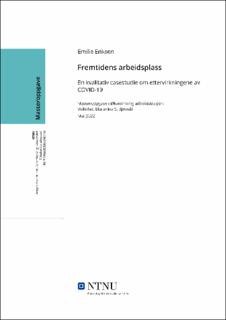| dc.description.abstract | Covid-19 har utløst radikale endringer etter at regjeringen stengte ned Norge i mars 2020. Arbeidstakere har opplevd økt bruk av fjernarbeid og hjemmekontor, som igjen kan tenkes å utløse et nytt arbeidskonsept i fremtiden, en hybrid arbeidsløsning. For å belyse pandemiens påvirkning på norsk arbeidsmarked har jeg derfor utarbeidet følgende problemstilling:
«Hvordan har norske arbeidstakere og HR erfart en arbeidshverdag på hjemmekontor, og hvilke forventninger har de til fremtidens arbeidsplass?»
For å svare på problemstillingen er det benyttet en kvalitativ forskningsmetode. Det er gjennomført semistrukturerte dybdeintervju med ansatte og HR i en casebedrift. Gjennom intervju har jeg fått et innblikk i deres erfaring på hjemmekontor og deres forventning til fremtidens arbeidsplass. Jeg har drøftet problemstillingen i lys av motivasjonsteori og teori om HR og deres rolle i en organisasjon.
Hovedfunn viser at ansatte og HR har gode erfaringer fra hjemmekontor. Dette belyses gjennom økt effektivitet, og ved at ansatte ønsker og forventer mer hjemmekontor eller fjernarbeid i fremtiden. Årsaken til at ansatte har hatt det fint på hjemmekontor er gode fysiske og psykososiale arbeidsforhold. Ansatte er tilfreds med omgivelser og utstyr, har gode digitale kommunikasjonskanaler, opplevelse av tilhørighet og medbestemmelse hos leder, fleksibilitet og autonomi, og bedre balanse mellom jobb og familie.
Studien avdekker også viktige områder organisasjoner anbefales å rette oppmerksomhet til i overgang til en hybrid arbeidsplass. Et funn er for eksempel at ansatte har opplevd mindre struktur på hjemmekontor, som fører til mindre pauser og mer arbeid ut over oppsatt arbeidstid. Det er også mangel på retningslinjer ved fjernarbeid i dag. Det er dessuten grunn til å tro at tilhørigheten vil kunne svekkes over lengre perioder med hjemmekontor. Ansatte savner det sosiale og ser at det er vanskeligere å skape relasjoner hjemmefra. | |
| dc.description.abstract | Covid-19 has triggered radical changes after the government shut down Norway in March 2020. Employees have experienced increased use of telework and home office, which in turn may trigger a new work concept in the future, a hybrid work solution. In order to shed light on the pandemic's impact on the Norwegian labor market, I have prepared the following research question:
"How have Norwegian employees and HR experienced teleworking from home, and what expectations do they have for the workplace of the future?"
To answer the problem, a qualitative research method has been used. Semi-structured in-depth interviews have been conducted with employees and HR in a case company. Through interviews, I have gained an insight into their experience in the home office and their expectation of the workplace of the future. I have discussed the issue in the light of motivation theory and theory about HR and their role in an organization.
Main findings show that employees and HR have good experiences from home offices. This is highlighted through increased efficiency and shown through the employee’s expectations and desires for more home office and telework in the future. Reasons for good experiences at the home office is good physical and psychosocial working conditions. Employees are satisfied with the environment and equipment, have good digital communication channels, experience of belonging and co-determination with the manager, flexibility and autonomy, and a better balance between work and family.
The study also reveals important areas that organizations are advised to pay attention to in the transition to a hybrid workplace. Firstly, employees have experienced less structure in the home office, which leads to less breaks and more work beyond the set working hours. Secondly, there is also a lack of guidelines for teleworking today. And thirdly, there is reason to believe that affiliation may be weakened over longer periods with home office or telework. Employees miss the social when not at the office. Also, they experience that it is more difficult to create relationships from home | |
